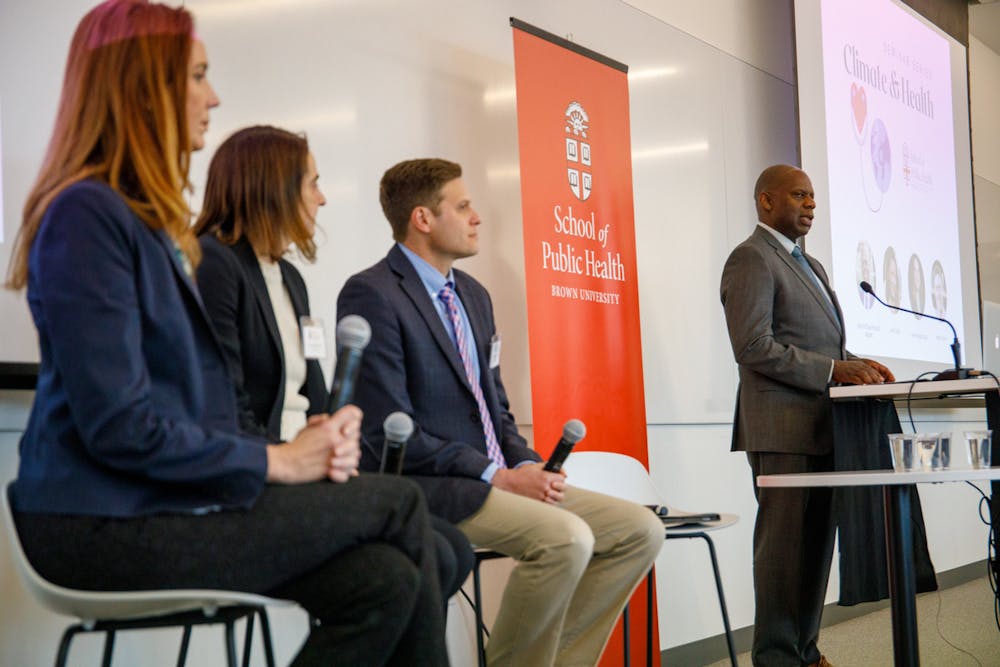The School of Public Health hosted the final event in its Climate and Health Seminar Series titled “Why climate change is the next public health emergency,” Wednesday afternoon at 225 Dyer St.
At the event, a panel of four University experts and researchers spoke directly to community members about climate change and population health. The speakers included Ronald Aubert, interim dean of the School of Public Health; Kim Cobb, director of the Institute at Brown for Environment and Society; Irene Papanicolas, director of the Center for Comparative Health Systems; and Adam Levine, director of the Watson Institute’s Center for Human Rights and Humanitarian Studies.
Aubert began the event by encouraging audience members to “think about why many climate and public health experts believe that climate change is a public health emergency.”
“Climate change is a growing challenge that continues to impact all of us,” he said. “Climate change and health care are exactly the sort of complex issues that we’d like to take on here at Brown University.”
Cobb, who also serves on the Biden administration’s President’s Intelligence Advisory Board, has conducted extensive research on climate change and weather extremes. She addressed the impact of rising temperatures on weather patterns, with a focus on how these dangerous climate irregularities impact global health.
“For every increment of warming, we’re baking in more and more health and weather extremes,” Cobb explained. “So heat waves are the most obvious consequence of warming, and those are some of the ones that are indeed the most deadly, causing catastrophic losses every year.”
In addition to increasing temperatures, Cobb cited excessive rainfall, flooding, drought and wildfires as other threats to public health.
She added that the climate crisis will not impact populations equally. For example, those most impacted by extreme heat will be low-income individuals along with “communities of color,” older adults, children and those “already subject to such gross health disparities,” Cobb said.
“This climate change emergency … is a health justice emergency,” she added. “And that will accelerate going forward.”
Levine, whose research has focused on climate and infectious diseases, said that “every day, millions of people around the world are moving right into the path of natural hazards that we know are going to become more frequent and more severe.”
He added that these hazards are “not just storms and flooding.” Other natural disasters exacerbated by climate change include earthquakes and volcanic eruptions, which Levine said both directly and indirectly cause suffering and countless deaths.
“There are going to be individuals who are directly killed by the heatwave or who are directly drowned in the flooding,” he said. “But then there’s also the woman who’s trying to give birth but can’t get to the hospital now because the roads have been washed out.”
He added that climate change also plays a role in affecting the severity of different infectious diseases.
For Levine, these threats mean “that we really need to start … thinking a lot more about adaptations,” both in terms of global health development and humanitarianism.
Climate change has also been “linked to cardiovascular mortality, cerebrovascular mortality (and) respiratory disease,” said Papanicolas, whose research involves comparing health systems.
Papanicolas discussed potential steps for harm reduction and health improvement in the face of a “climate crisis” during an age of “inequitable health” systems.
She acknowledged that governmental involvement may be difficult considering the global nature of the climate crisis and noted that “it doesn’t fall on every health system equally.”
“The health systems that are the biggest emitters are not necessarily those that are facing the biggest consequences,” Papanicolas said. “How do we create global action in a way where people become a part of the solution not only because it benefits local boundaries, but because it’s for the greater good?”
According to Cobb, the University has the potential to positively contribute to the fight against climate change and the global health crisis.
“Brown has such a global leadership role to play,” she said. “And we have a local, regional leadership role to play, and we have this really amazing nexus of experts already coming together.”
Cobb said that the development of sustainable partnerships between academic experts and community members could help bring relief to Providence when disaster strikes.
“Community members can bring their expertise into helping us understand what it means to survive a heatwave in Providence today,” she said. “And what it could mean to develop solutions with your community, both in the near term … and in the longer term.”
Levine also emphasized the importance of thinking both globally and locally.
“One of the great things about being in Rhode Island is that it’s a very small and very blue state,” he said. “We have incredible opportunities to experiment from a policy perspective and to be at the forefront of passing new legislation in a state that really shows other states around the country, and perhaps other places around the world, what is possible.”

Sofia Barnett is a University News editor overseeing the faculty and higher education beat. She is a junior from Texas studying history and English nonfiction and enjoys freelancing in her free time.





